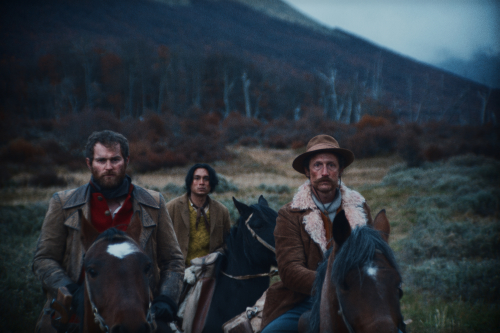
Festival de Cannes
MOVIE REVIEW
The Settlers (2023)
On a windswept pampas a group of English-speaking men are building a barbed wire fence in silence, until the machinery makes an awful noise and a man lets out a scream. It was only his arm, he says from the ground, as the severed stump pulses blood and the others watch in silence. He'll be up and back at work in just a moment, if someone would bandage it. No one moves, except the overseer, a Scottish lieutenant named MacLennan (Mark Stanley), who rides up on horseback. The injured man's affirmations that he’s absolutely fine reach a higher pitch as MacLennan sighs in frustration, unholsters his gun, and shoots the injured man in the head. That's how callously death arrived for you at the turn of the last century in Tierra del Fuego, the literal end of the world.
In this extraordinary debut, director Felipe Gálvez, who cowrote the script with Antonia Girardi, has made a historical epic that, despite its small scale, directly attacks laissez-faire capitalism, the English class system and Chilean racism to uncover a bloodsoaked chapter of world history. The answer as to who was responsible for the crime at the center of this film has only recently been revealed: the Menéndez family, the principal landowners in Tierra del Fuego at the time and whose descendants still own and operate major businesses in the area. It was the O.G. patriarch José Menéndez (Alfredo Castro) who hired MacLennan and his crew to fence off his land; and it’s him who wants his sheep more easily brought to market, necessitating the removal of the indigenous people who have always lived on the land he now owns. The nasty sequence in his beautiful home, where MacLennan kisses arse and Segundo (Camilo Arancibia) observes in silence as the Menéndez daughter (Adriana Stuven) makes their racist philosophy explicit is both shocking and not shocking at all. Nowadays we’re just better at euphemisms.
How Segundo, a mixed race man rejected by both sides of his family, ended up in Menéndez's army is never really made clear. However despised he is, the whites need his skills as a translator, and want him around thanks to his being a crack shot. When MacLennan is given that secret two-man job, he picks Segundo to accompany him, but it's only at departure that a third man joins them. He's a Texan named Bill (Benjamin Westfall, in whose mouth slime wouldn’t melt), a veteran of the Indian wars in the American Southwest, who has made his way to the bottom of the continent thanks to his skills as a tracker and his appetite for killing. This miserable band begins a grim horse ride across desolate, beautiful countryside, toward a camp of the native people who wear animal skins and have no weapons other than handmade knives.
Harry Allouche’s music does a notable job of emphasizing the dread, but Simone D’Arcangelo’s cinematography wastes no opportunity to show the beauty of the world around these men on their horrible errand. The shot of Bill and MacLennan with their rifles as the fog parts around them is especially remarkable. The beauty of the morning of the slaughter is hard to fathom. It’s equally hard to fathom Segundo’s predicament as the catastrophe unfolds. If he murders any of these innocents he becomes no better than these bastards, but if he doesn’t shoot somebody, Bill or MacLennan will surely kill him. He shoots the air instead, and hopes that will be enough. Mr. Arancibia does a wonderful job of showing how hard Segundo must work to mask his horror, and how desperately he must calculate the odds in every human encounter. Later he realizes the others have spared a woman, having chained her to the ground to be raped at their leisure. Segundo refuses his turn, leading MacLennan to throw such a terrifying tantrum that it’s clear the danger Segundo is in has only increased. Mr. Stanley has primarily worked in British television, from “Game of Thrones” to “Happy Valley,” but here makes a devastating impression as the newest evilest villain in some time. Well, until everyone bumps into a section of the Argentinian army, captained by an Englishman, Colonel Martin (Sam Spruell), a man so menacing MacLennan is in frightened tears almost on sight. The worst is very much yet to come.
Most historical stories ignore that people have always roamed the world, bringing their baggage from home with them, but “The Settlers” is whip-smart on every level. Segundo must stay alive without losing his humanity and his appalling “hero’s journey” is scorchingly unforgettable. What’s more, the ending centers a woman named Kiepja (Mishell Guaña), a quiet reminder that horrors exist which not even Segundo could dream of. Mr. Gálvez has arrived on the international cinema scene in a very big way; and “The Settlers” is a major achievement. It’s especially recommended to horror aficionados, anyone who cares about indigenous rights, or people who just hate the British. It was the single most affecting film this critic saw at the Cannes Film Festival.
Comments